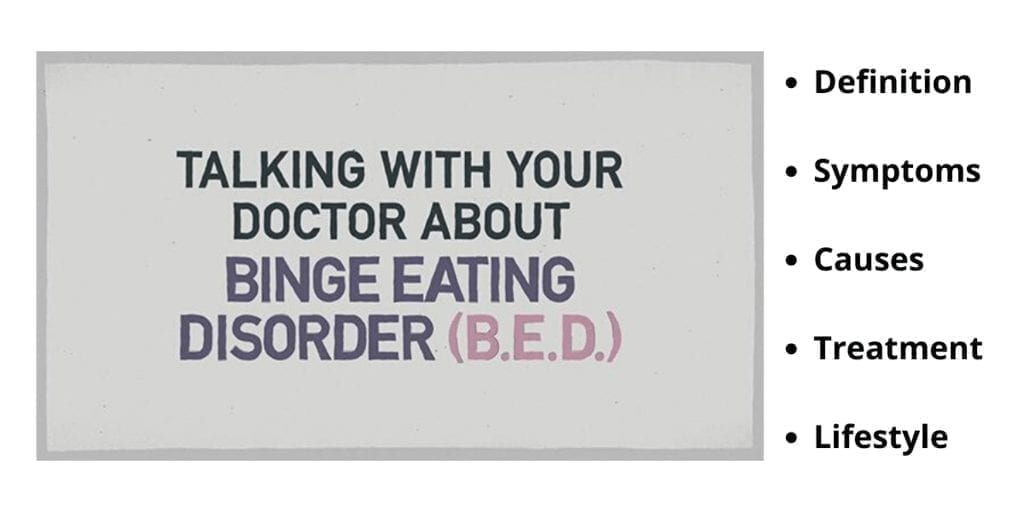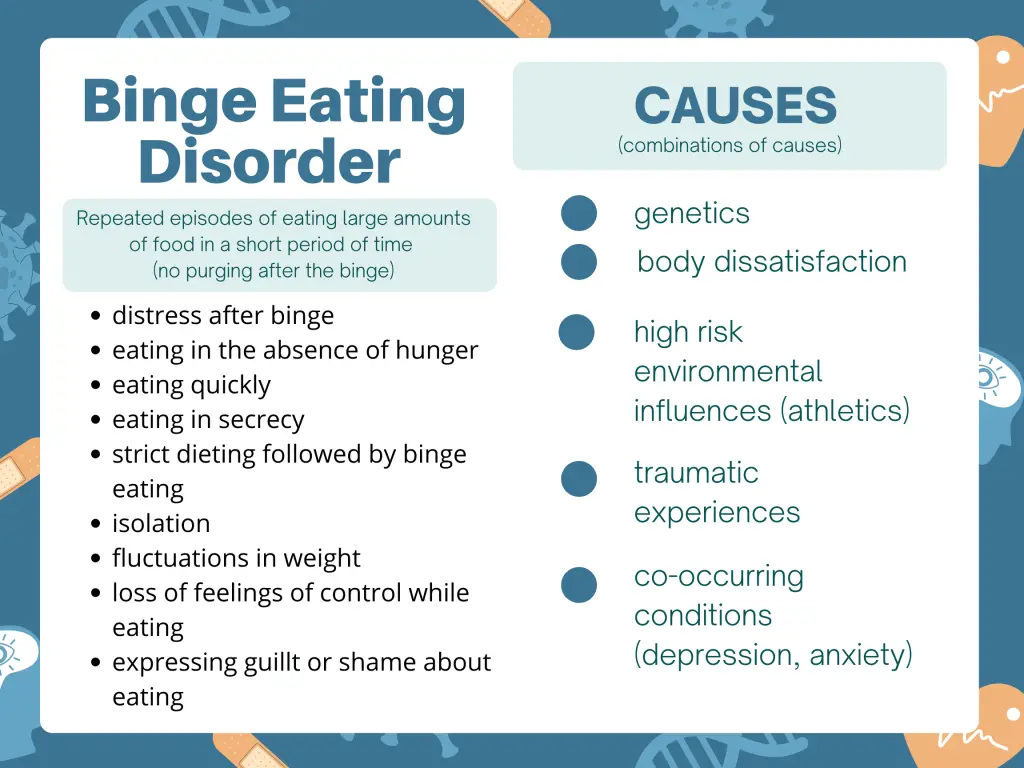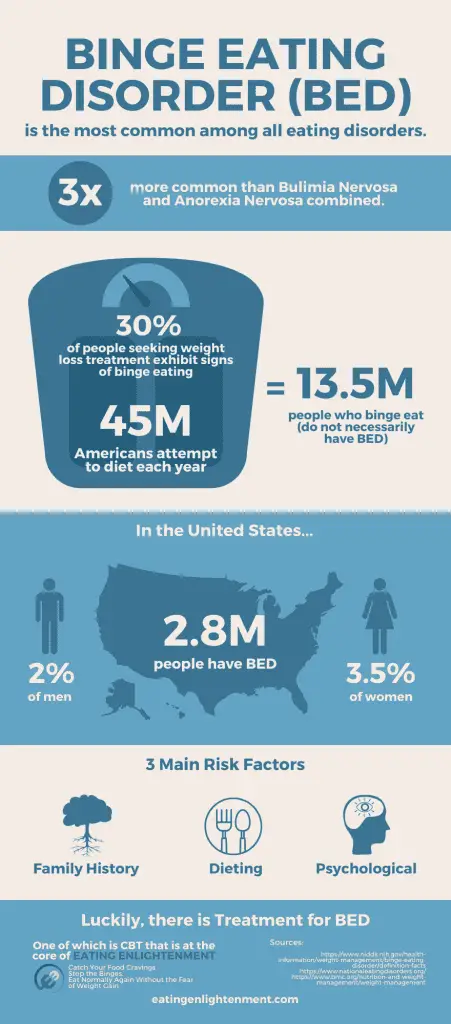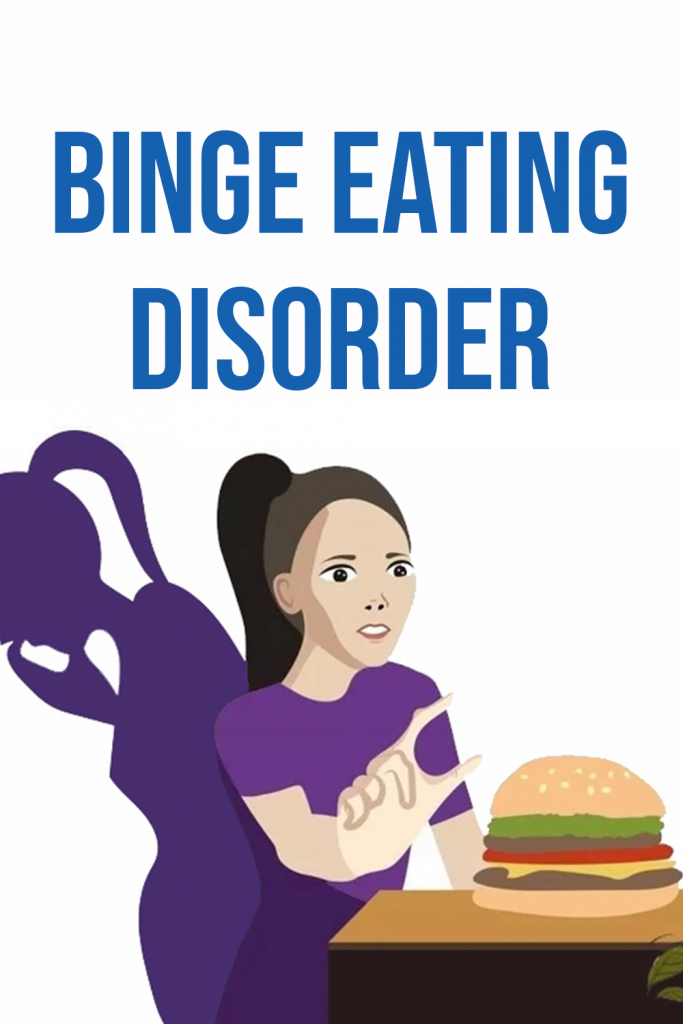This post about binge eating disorder contains sections about:
- Binge Eating Disorder Overview
- Symptoms of Binge Eating Disorder
- Binge Eating Disorder Statistics
- Eating Disorder Therapy and Treatment Approaches

Binge Eating Disorder Overview
Binge Eating Disorder is a common eating disorder which can adversely affect the health of an individual if not treated.
Frequent, unhealthy episodes of consuming large amounts of food characterize this disorder. These episodes are followed by shame, weight gain and guilt feelings.
Binge Eating may affect overall health, habits, body weight, self-esteem and mental health.
Fortunately, Binge Eating Disorder has very effective treatments. Below you can read about the most common forms of binge eating disorder treatment.
There are also many healthy lifestyle strategies to incorporate into daily life. I’ve listed many of these steps and tips further below.
Dictionary definition versus the clinical definition
Google Definition: consuming large quantities of food in a short period of time, typically as part of an eating disorder.
In contrast, the National Eating Disorders Association provide a much more detailed clinical definition of Binge Eating Disorder:
- Recurrent and persistent episodes of binge eating. An episode of binge eating has both of the following:
- Eating, in a discrete period of time (e.g., within any 2-hour period), an amount of food that is definitely larger than what most people would eat in a similar period of time under similar circumstances.
- A sense of lack of control over eating during the episode (e.g., a feeling that one cannot stop eating or control what or how much one is eating).
Binge eating episodes are associated with three (or more) of the following:
- Eating much more rapidly than normal
- Consuming food until feeling uncomfortably full
- Eating large amounts of food when not feeling physically hungry
- Eating alone because of embarrassment by how much one is eating
- Feeling disgusted with oneself, depressed, or very guilty after overeating
- Marked distress regarding binge eating
- Absence of regular compensatory behaviors (such as purging, or exercising excessively. For example, if you purge then technically speaking you have the eating disorder “bulimia”).
BED severity is as follows:
- Mild: 1 to 3 episodes per week
- Moderate: 4 to 7 episodes per week
- Severe: 8 to 13 episodes per week
- Extreme: 14 or more episodes per week
Binge Eating Disorder Symptoms

- The disappearance of large amounts of food in short periods of time
- Seems awkward eating around others
- Cutting off whole food groups (no fat, no carbohydrates, no meat, vegetarianism / veganism)
- Feels scared or at risk of eating in public or with others
- Steals or hoards food in strange places
- Creates daily plans or practices to make time for binge sessions
- Eating alone because the amount of food being eaten
- Feelings of disgust, depression or guilt after overeating
- Weight fluctuations
- Feelings of low self-esteem
- Physical Noticeable weight fluctuations, both up and down
- Stomach cramps, other unspecific gastrointestinal complaints (constipation, acid reflux, etc.)
Binge Eating Disorder Statistics

Binge Eating Disorder is the most common of the eating disorders in the United States.
In adults the disorder affects 3.5% of women, 2% of men, and up to 1.6% of adolescents.
In women it is most common in early adulthood but in men it is more common at midlife.
- Although most people with obesity don’t have binge eating disorder, up to 2/3 of people with the eating disorder are obese and have the health issues associated with this condition.
Binge Eating Disorder Treatment
Effective evidence-based treatments are available for Binge Eating Disorder (and other eating disorders).
These include specific forms of cognitive behavioral therapy and interpersonal therapy, which I discuss below.
While medicine can be useful, therapy is the more effective of the two solutions.
Because therapeutic treatments are more effective than medicine without the potential downsides, I am focusing here on therapy treatments.
Psychotherapy methods include:
Cognitive Behavioral Therapy: Cognitive Behavioral Therapy can help you cope better with problems that can cause episodes of binge eating, such as negative body feelings, low self-esteem or a depressed mood. It gives you a better sense of control over your actions, and helps regulate habits around food and eating. Overall, this approach focuses on awareness of your thoughts and reducing obsessive mental ruminating.
Interpersonal Psychotherapy: This type of therapy centers on your relationships with others. The aim is to improve your interpersonal skills— how you respond to other individuals, including families, friends and colleagues. This can help to reduce binge eating caused by a troubled relationship, isolation and unhealthy communication skills.
Dialectical Behavioral Therapy: This form of therapy can help you learn behavioral skills to help you tolerate stress and discomfort, regulate your emotions, focus and improve your relationships with others, all of which can reduce the desire for bingeing.
The above 3 treatments are the most mainstream and well-studied psychotherapy treatments of disorder binge eating.
Which Therapy Is Best For Binge Eating Disorder Treatment?
A study in 2010 with 205 participants asked this very question.
The researchers concluded that “Interpersonal psychotherapy and Cognitive Behavioral Therapy are significantly more effective than Behavioral Weight Loss in eliminating binge eating after 2 years.”
You can access the full version of this national eating study here – https://jamanetwork.com/journals/jamapsychiatry/article-abstract/210525
My therapeutic approach utilizes a combination of Intuitive Eating, Health At Every Size, and Cognitive Behavioral Therapy Principles. I’ve found that while Cognitive Therapy is great, some additional Intuitive Eating training for a binge eating client really helps them connect the mental cognitive exercises to their food and body.
Because my treatment approach to binge eating disorder and other disordered eating disorders involves Cognitive Behavioral Therapy, I’ve included a brief section explaining this treatment approach below.
Cognitive behavioral therapy

Cognitive behavioral therapy for eating disorder binge analyzes the relationships between negative eating, body shape and weight-related thoughts, feelings and behaviors.
Once the mental health professional and client identify the causes of negative emotions, strategies can be developed to help people change them.
Specific interventions include setting goals, self-monitoring, regular meal patterns, changing self and weight thoughts, and encouraging healthy weight-control habits that avoid the health risks of dieting.
Overall, treatment led by a therapist or psychiatrist is the most successful treatment for people with eating disorder BED.
One study found that 79 percent of participants no longer have binge eating following 20 CBT meetings, with 59 percent only having success after a year, see here for study.
Another option is self-help Cognitive Behavioral Therapy.
Clients are given a checklist in this method to work with on their own. They also have the opportunity to attend extra sessions with a therapist to help direct them and set goals.
Intuitive Eating Tips to Help Treat Binge Eating Disorders
This section includes many strategies found in Intuitive Eating that go beyond Cognitive Behavioral Therapy.
- Keep a diary of food and mood. An important step in learning how to control binge impulses is identifying personal triggers and symptoms of binge eating.
- Practice patience. This can help to increase bingeing and cause sensitivity while helping to increase self-control and retain self-acceptance.
- Find someone to converse with. Having support is important, whether through a partner, family, friend, binge eating support groups or online.
- Choose healthy foods. A diet consisting of high protein products and healthy fats, regular meals, and whole grains can help satisfy appetite and provide the nutrients required.
- Start working out. Exercise can help increase weight loss, improve body image, reduce symptoms of anxiety and increase mood. Intuitive Eating places an emphasis on movement and finding joy in fitness instead of focusing on weight loss outcomes.
- Get lots of sleep. Sleep deprivation correlates with elevated calorie intake and abnormal eating patterns. Having at least 7–8 hours of good sleep per night is suggested.
- Don’t skip medication, treatment sessions or meal times. If you have a meal plan do your best to stick to it and don’t let your overall efforts derail any setbacks.
- Do not diet. Trying to eat will cause further binge events, contributing to a vicious cycle which is difficult to break.
Here are other some other tips 🙂
- Eat breakfast. Many people suffering from binge-eating disorder skip breakfast. But if you eat breakfast later in the day, you may be less prone to eating higher calorie meals.
- Arrange your surroundings. For some people the presence of certain foods can cause binges. Hold snack items enticing away from home or restrict your access to those products the best you can.
- Get enough nutrients for your brain. Just because you may consume a lot through binges doesn’t imply that you eat the kinds of food that provide all the essential nutrients.
- Stay connected. Self-harm happens in isolation. Don’t isolate from caring for family members and friends who want to see you healthy. Understand that they have a heart for your best interests.
- Become responsible.
- Be easy on yourself. Don’t buy into self-criticism.
- Identify circumstances and internal stories that can cause unhealthy eating behavior, so that you can establish an action plan to address them.
- Look for positive role models that might help to lift your self-esteem. (Note, those ultra-thin models or celebrities featured in women’s magazines often do not reflect balanced, natural bodies.)
- Try to find a dependable relative or friend you feel safe sharing your experience with, and who don’t give you unwanted advice.





Really helpful article! the tips that you offer are helpful.
Great Thanks!